人教新目标版英语八年级上Unit 5 Do you want to watch a game show?单元期中复习课件(41张PPT无素材)
文档属性
| 名称 | 人教新目标版英语八年级上Unit 5 Do you want to watch a game show?单元期中复习课件(41张PPT无素材) | 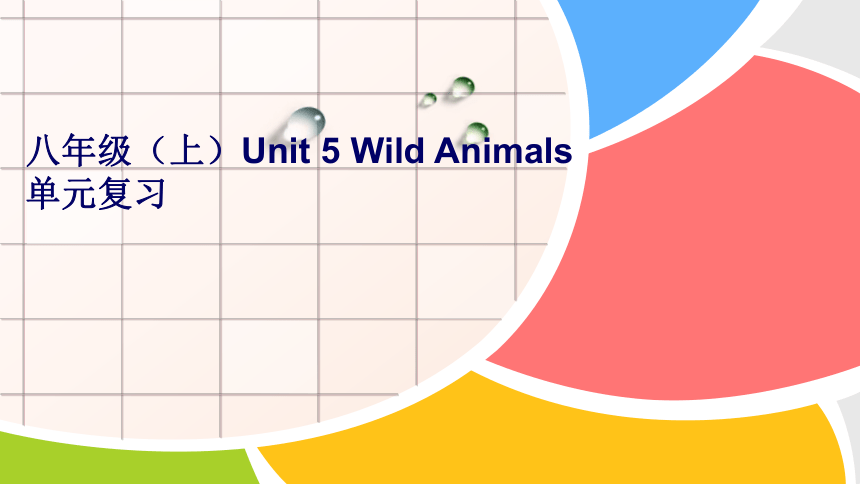 | |
| 格式 | zip | ||
| 文件大小 | 199.3KB | ||
| 资源类型 | 教案 | ||
| 版本资源 | 人教新目标(Go for it)版 | ||
| 科目 | 英语 | ||
| 更新时间 | 2021-11-18 23:59:52 | ||
图片预览

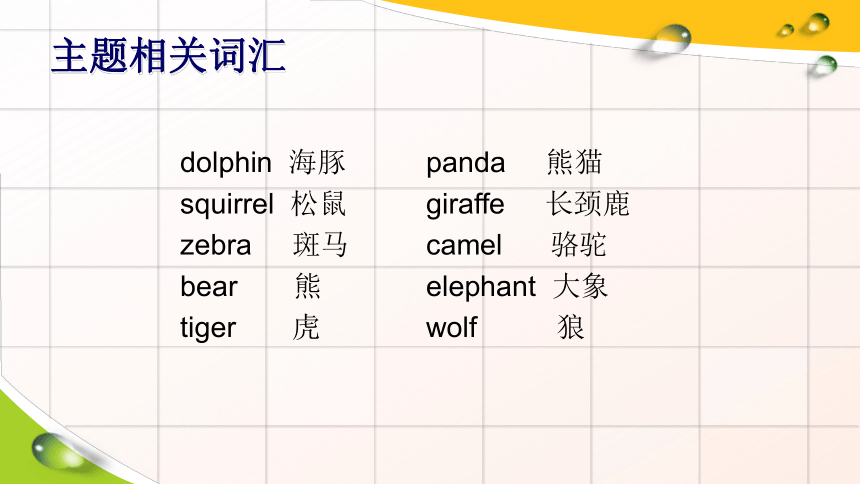
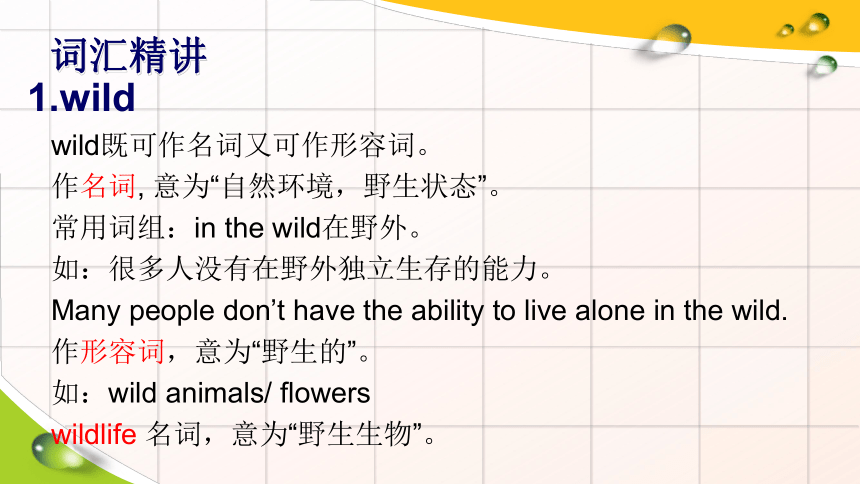
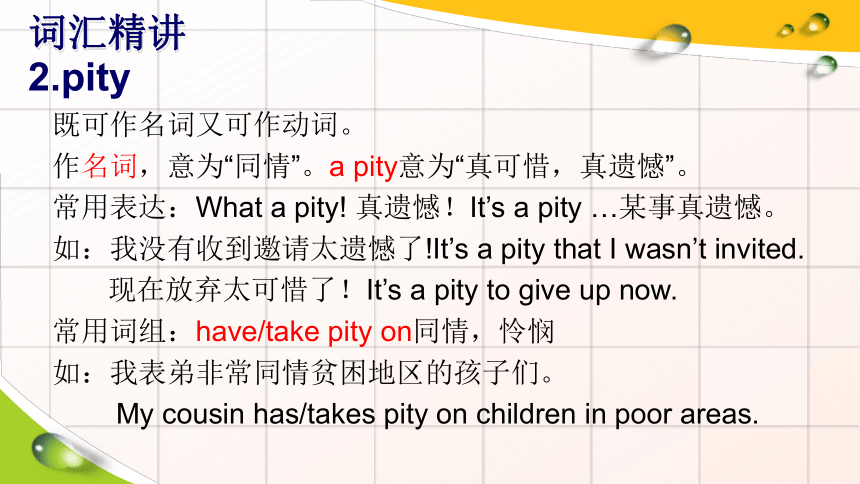
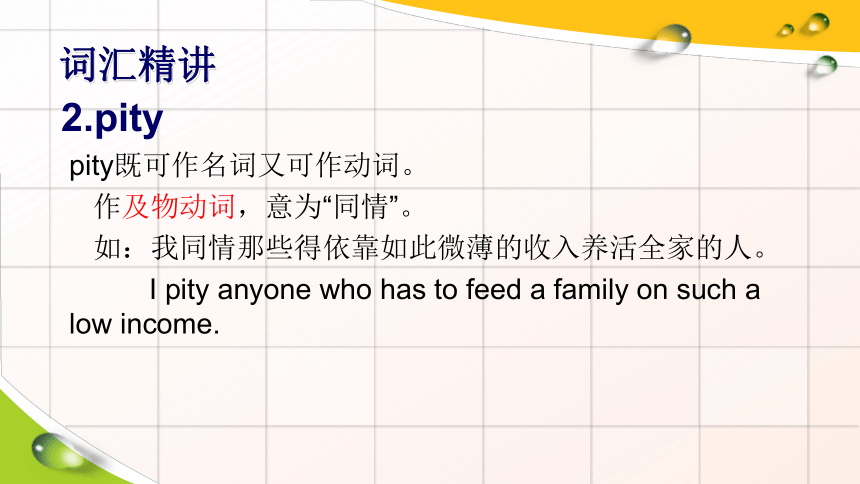
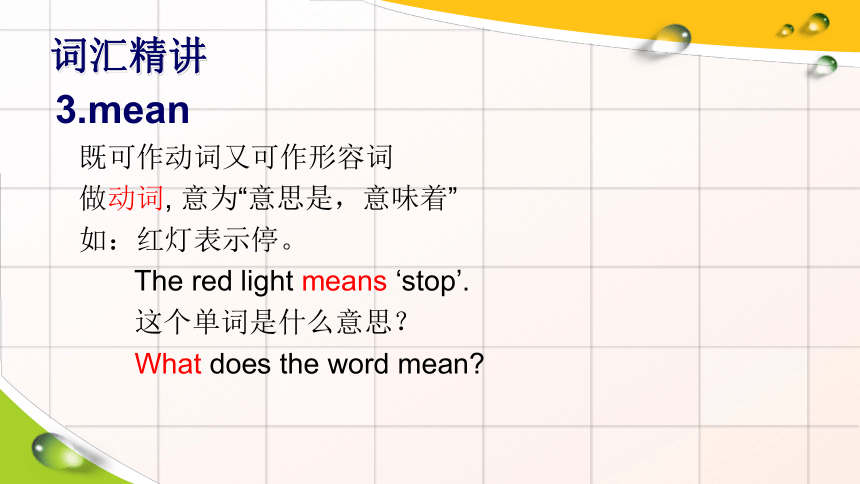
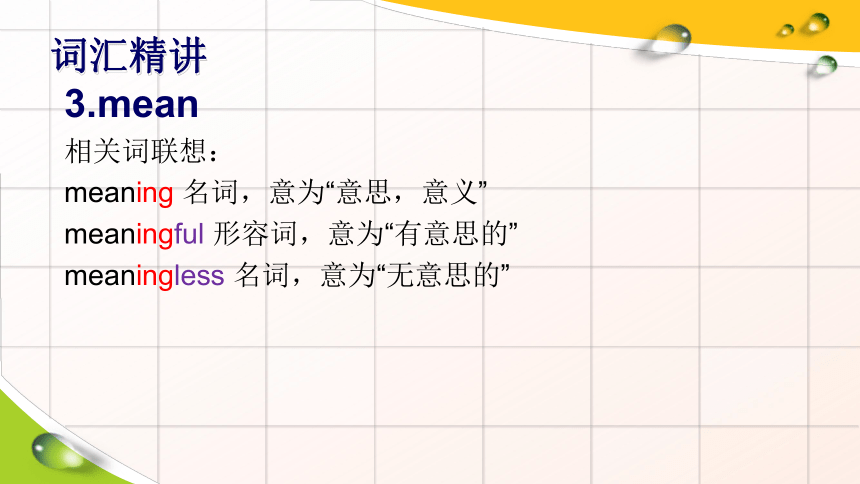
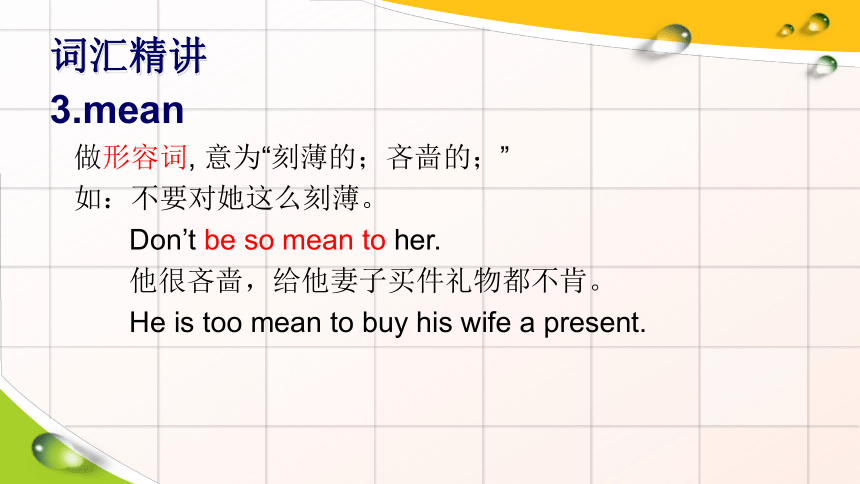
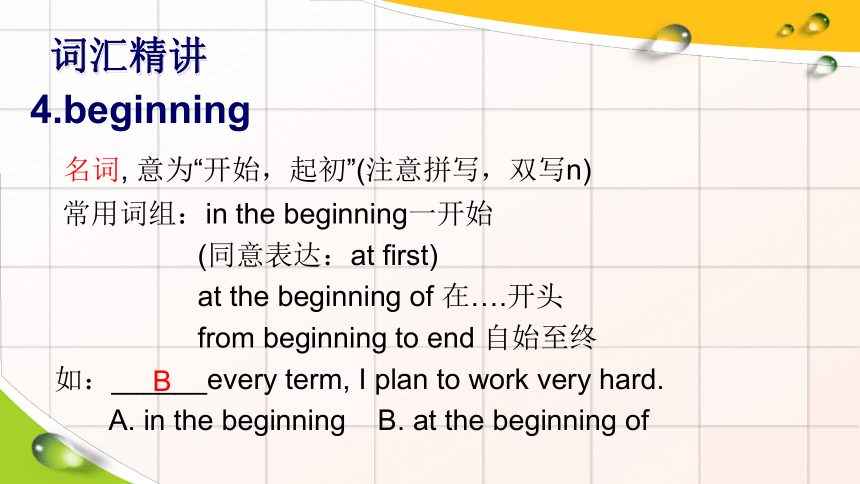
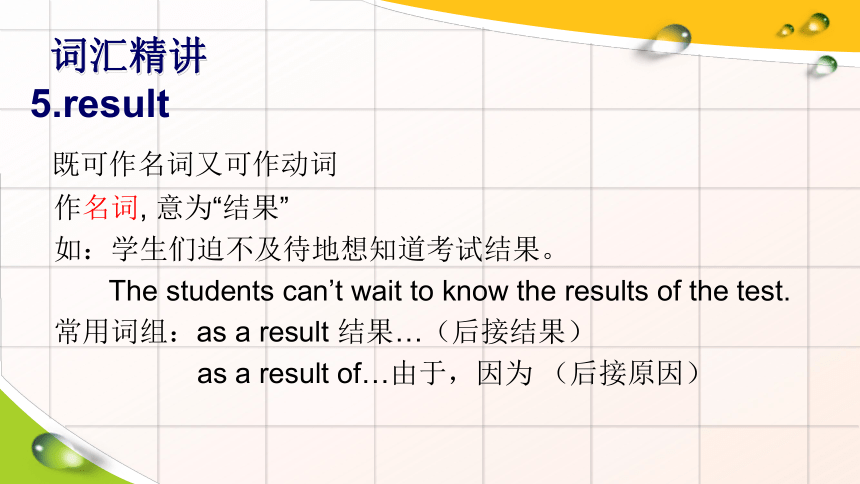
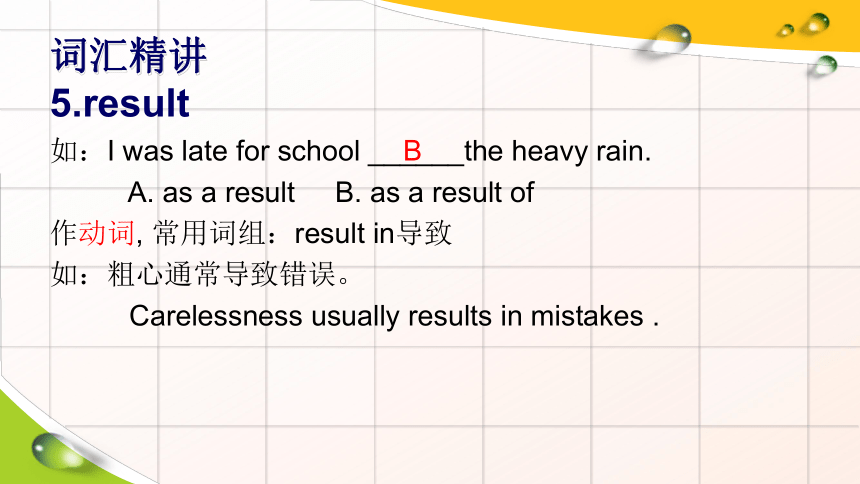
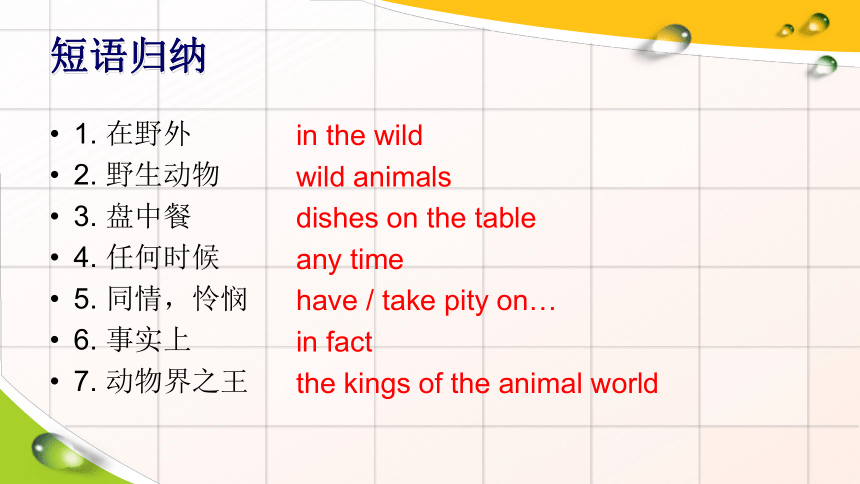
文档简介
(共41张PPT)
八年级(上)Unit 5 Wild Animals
单元复习
主题相关词汇
dolphin 海豚
squirrel 松鼠
zebra 斑马
bear 熊
tiger 虎
panda 熊猫
giraffe 长颈鹿
camel 骆驼
elephant 大象
wolf 狼
词汇精讲
1.wild
wild既可作名词又可作形容词。
作名词, 意为“自然环境,野生状态”。
常用词组:in the wild在野外。
如:很多人没有在野外独立生存的能力。
Many people don’t have the ability to live alone in the wild.
作形容词,意为“野生的”。
如:wild animals/ flowers
wildlife 名词,意为“野生生物”。
2.pity
既可作名词又可作动词。
作名词,意为“同情”。a pity意为“真可惜,真遗憾”。
常用表达:What a pity! 真遗憾!It’s a pity …某事真遗憾。
如:我没有收到邀请太遗憾了!It’s a pity that I wasn’t invited.
现在放弃太可惜了!It’s a pity to give up now.
常用词组:have/take pity on同情,怜悯
如:我表弟非常同情贫困地区的孩子们。
My cousin has/takes pity on children in poor areas.
词汇精讲
词汇精讲
pity既可作名词又可作动词。
作及物动词,意为“同情”。
如:我同情那些得依靠如此微薄的收入养活全家的人。
I pity anyone who has to feed a family on such a low income.
2.pity
3.mean
既可作动词又可作形容词
做动词, 意为“意思是,意味着”
如:红灯表示停。
The red light means ‘stop’.
这个单词是什么意思?
What does the word mean
词汇精讲
3.mean
相关词联想:
meaning 名词,意为“意思,意义”
meaningful 形容词,意为“有意思的”
meaningless 名词,意为“无意思的”
词汇精讲
3.mean
做形容词, 意为“刻薄的;吝啬的;”
如:不要对她这么刻薄。
Don’t be so mean to her.
他很吝啬,给他妻子买件礼物都不肯。
He is too mean to buy his wife a present.
词汇精讲
4.beginning
名词, 意为“开始,起初”(注意拼写,双写n)
常用词组:in the beginning一开始
(同意表达:at first)
at the beginning of 在….开头
from beginning to end 自始至终
如:______every term, I plan to work very hard.
A. in the beginning B. at the beginning of
词汇精讲
B
5.result
既可作名词又可作动词
作名词, 意为“结果”
如:学生们迫不及待地想知道考试结果。
The students can’t wait to know the results of the test.
常用词组:as a result 结果…(后接结果)
as a result of…由于,因为 (后接原因)
词汇精讲
如:I was late for school ______the heavy rain.
A. as a result B. as a result of
作动词, 常用词组:result in导致
如:粗心通常导致错误。
Carelessness usually results in mistakes .
词汇精讲
B
5.result
短语归纳
1. 在野外
2. 野生动物
3. 盘中餐
4. 任何时候
5. 同情,怜悯
6. 事实上
7. 动物界之王
in the wild
wild animals
dishes on the table
any time
have / take pity on…
in fact
the kings of the animal world
8. 叫这只熊猫宝宝希望
9. 仅重100克
10. 第一次
11. 不再是个孩子
12. 起初,一开始
13. 喝母乳
14. 面临严重问题
短语归纳
call the baby panda Xi Wang
weigh just 100 grams
for the first time
not a baby any more
in the beginning/ at first
drink one’s mother’s milk
face serious problems
15. 主要以一种特殊的
竹子为食
16. 采取行动
17. 立刻
18. 制定法律
19. 处于危险中
20. 出生
短语归纳
live mainly on a special kind of bamboo
take action
right away
make laws
in danger
be born
句型分析
1. When Xi Wang was born, she weighed just 100 grams and looked like a white mouse. (page58)
希望出生时,只有一百克重,看起来像只小白鼠。
短语be born意思是“出生,出世”
如:Linda出生在美国。
Linda ______________ in the USA.
这对双胞胎出生在去年十二月。
The twins ______________ in December last year.
was born
were born
句型分析
2. However, the bamboo forests are becoming smaller and smaller. As a result, pandas may not have a place to live or food to eat. (page58)
然而竹林变得越来越少。因此,大熊猫可能无处生存,无以为食。
1)smaller and smaller 是比较级more and more 结构,表示“越 来越…”.
如:物价越来越高了。The prices are getting higher and higher.
句型分析
2. However, the bamboo forests are becoming smaller and smaller. As a result, pandas may not have a place to live or food to eat. (page58)
然而竹林变得越来越少。因此,大熊猫可能无处生存,无以为食。
2)place to live和food to eat 中的动词不定式均作定语,修饰其前面的名词。
如:something to drink
nothing to worry about
a house to live in
a piece of paper to write on
句型分析
2. However, the bamboo forests are becoming smaller and smaller. As a result, pandas may not have a place to live or food to eat. (page58)
然而竹林变得越来越少。因此,大熊猫可能无处生存,无以为食。
3) as a result 因此,后接结果。
as a result of由于,后接原因。
如:今早下大雨,我上学迟到了。
It rained heavily this morning. As a result, I was late for school.
I was late for school this morning as a result of the heavy rain.
句型分析
3. If we do nothing, soon there may be none left. (page58)
如果我们什么也不做,很快世界上就一只熊猫也不剩了。
1) 句中left 是leave的过去分词,意思是“剩下的,留下的”。
如:There is still some cake left.
还剩下些蛋糕。
句型分析
3. If we do nothing, soon there may be none left. (page58)
如果我们什么也不做,很快世界上就一只熊猫也不剩了。
2). none的用法 代词 意为“没有一个人/物”
如:I have many books, but none(of them) is new.
我有很多书,但没有一本是新的。
none和nothing的区别:用法不同,none 常和of连用;意思不同,nothing指什么都没有而none指没有上文提及的人或物。
练一练:--- Is there any bread left ---_________________.
None
句型分析
3. If we do nothing, soon there may be none left. (page58)
如果我们什么也不做,很快世界上就一只熊猫也不剩了。
3) if从句+主句句式当中的时态:主将从现
练一练:如果明天不下雨,我们就去露营。
If it doesn’t rain tomorrow, we’ll go camping.
如果你少吃点,你会更瘦。
If you eat less, you’ll be thinner.
句型分析
4. However, we do believe that where there is Xi Wang, there is hope. (page58)
然而,我们相信熊猫在,希望就在。
1) however 然而,表转折。用在句首或句中,常用逗号隔开。
如:
It’s raining hard. However, I think we should go out.
It’s raining hard, but I think we should go out.
句型分析
4. However, we do believe that where there is Xi Wang, there is hope. (page58) 然而,我们相信熊猫在,希望就在。
2) 句中的do是助动词,后接动词原形,用来加强语气。
如:I like playing football. I do like playing football.
He likes playing football. He does like playing football.
I liked playing football. I did like playing football.
句型分析
4. However, we do believe that where there is Xi Wang, there is hope. (page58) 然而,我们相信熊猫在,希望就在。
3) 句中的where there is Xi Wang, there is hope是仿照英语谚语Where there is a will, there is a way.而来,该谚语的意思是“有志者事竟成” 。
句型分析
5. For example, it is very difficult for pandas to have babies. (page58)比如,熊猫很难有孩子。
1) for example 比如,一般后接句子单独举例。
如:很多野生动物都处于危险当中。比如,老虎们正在失去它们的栖息地。
Many wild animals are in danger. For example, tigers are losing their living areas.
句型分析
5. For example, it is very difficult for pandas to have babies. (page58)比如,熊猫很难有孩子。
1) for example 和such as 的区别:
…For example, air is invisible.
You can buy some fruit such as/ like apples and oranges.
句型分析
5. For example, it is very difficult for pandas to have babies. (page58)比如,熊猫很难有孩子。
2) 句型It is +形容词for somebody to do something意为“对某人来说做某事…”。
如:学英语对我们来说很重要。
It’s important for us to learn English.
句型分析
5. For example, it is very difficult for pandas to have babies. (page58)比如,熊猫很难有孩子。
比较:It is +形容词for somebody to do something.
It is +形容词of somebody to do something.
练一练:
It was so careless ______ you to make such a mistake.
of
Read these sentences and try to understand may.
1. If we do nothing, soon there may be none left.
2. The bamboo forests are becoming smaller and smaller. As a result, pandas may not have a place to live or food to eat.
语法点拨
A Using may for possibility
1. If we do nothing, soon there may be none left!
2. The bamboo forests are becoming smaller and smaller. As a result, pandas may not have a place to live or food to eat.
may 表示猜测,可能性(用于肯定句中或否定句中)
may not do... 意为“可能不......”
语法点拨
1. The little boy is crying when he saw the tigers.
He ________ (be) afraid of them.
2. I cannot go near the lions and tigers.
They __________ (hurt) me.
3. The baby panda is not drinking its mum’s milk.
It _____________ (not be) hungry.
4. The horse is standing with its eyes closed.
It ______________ (be sleeping).
语法点拨
may be
may be sleeping
may not be
may hurt
B Using verbs + to-infinitives
语法点拨
agree to do sth.
begin to do sth.
decide to do sth.
fail to do sth.
forget to do sth.
hope to do sth.
1. 在英语中某些及物动词后接动词不定式作宾语, 常用的此类动词有:
learn to do sth.
plan to do sth.
prepare to do sth.
remember to do sth.
try to do sth.
want to do sth.
语法点拨
语法点拨
e.g. Where will you plan to go this summer holiday
今年暑假你打算去哪儿?
I hope to watch the sunset.
我想看日落。
I want to take some photos of the sunrise.
我想拍几张日出的照片。
语法点拨
ask sb. to do
tell sb. to do
invite sb. to do
want sb. to do
would like sb. to do
teach sb. to do
advise sb. to do
2. to do 做宾语补足语
hear sb. do
see sb. do
watch sb. do
make sb. do
let sb. do
help sb. do
但有的动词后跟不带to的不定式作宾补,如:
语法点拨
remember to do sth. 记得去做某事
remember doing sth. 记得做过某事
区别
forget to do sth. 忘记去做某事
forget doing sth. 忘记做过某事
语法点拨
e.g.
Tom, 记得课后和我们一起打篮球。
Tom, remember to play basketball with us after class.
我记得上个月写了一封信给你。
I remembered writing a letter to you last month.
stop to do sth. 停下(正在做的)事去做
(另一件)事
stop doing sth. 停止做(正在做的)事
e.g. 让我们停下来休息一下。
Let’s stop to have a rest.
不要说话, 老师来了。
Stop talking. The teacher is coming.
区别
练一练
1. You must _____ (listen) to the teacher carefully in class.
2. Mary agreed _____ (go) shopping with Lucy.
3. Look! The boys ____________(play) football.
4. May decided ______ (buy) a book for Ann’s birthday.
5. Max tells funny jokes to make us ____(feel) happy.
listen
to go
are playing
to buy
feel
练一练c
6. Let’s ____ (go) on a trip tomorrow.
7. The policeman told the boys __________
(not play) football in the street.
8. Would you like something ________ (drink)
9. _________ (not be) late for class again.
10. I plan ________(travel) around the world in the summertime.
go
not to play
to drink
Don’t be
to travel
Bye!
八年级(上)Unit 5 Wild Animals
单元复习
主题相关词汇
dolphin 海豚
squirrel 松鼠
zebra 斑马
bear 熊
tiger 虎
panda 熊猫
giraffe 长颈鹿
camel 骆驼
elephant 大象
wolf 狼
词汇精讲
1.wild
wild既可作名词又可作形容词。
作名词, 意为“自然环境,野生状态”。
常用词组:in the wild在野外。
如:很多人没有在野外独立生存的能力。
Many people don’t have the ability to live alone in the wild.
作形容词,意为“野生的”。
如:wild animals/ flowers
wildlife 名词,意为“野生生物”。
2.pity
既可作名词又可作动词。
作名词,意为“同情”。a pity意为“真可惜,真遗憾”。
常用表达:What a pity! 真遗憾!It’s a pity …某事真遗憾。
如:我没有收到邀请太遗憾了!It’s a pity that I wasn’t invited.
现在放弃太可惜了!It’s a pity to give up now.
常用词组:have/take pity on同情,怜悯
如:我表弟非常同情贫困地区的孩子们。
My cousin has/takes pity on children in poor areas.
词汇精讲
词汇精讲
pity既可作名词又可作动词。
作及物动词,意为“同情”。
如:我同情那些得依靠如此微薄的收入养活全家的人。
I pity anyone who has to feed a family on such a low income.
2.pity
3.mean
既可作动词又可作形容词
做动词, 意为“意思是,意味着”
如:红灯表示停。
The red light means ‘stop’.
这个单词是什么意思?
What does the word mean
词汇精讲
3.mean
相关词联想:
meaning 名词,意为“意思,意义”
meaningful 形容词,意为“有意思的”
meaningless 名词,意为“无意思的”
词汇精讲
3.mean
做形容词, 意为“刻薄的;吝啬的;”
如:不要对她这么刻薄。
Don’t be so mean to her.
他很吝啬,给他妻子买件礼物都不肯。
He is too mean to buy his wife a present.
词汇精讲
4.beginning
名词, 意为“开始,起初”(注意拼写,双写n)
常用词组:in the beginning一开始
(同意表达:at first)
at the beginning of 在….开头
from beginning to end 自始至终
如:______every term, I plan to work very hard.
A. in the beginning B. at the beginning of
词汇精讲
B
5.result
既可作名词又可作动词
作名词, 意为“结果”
如:学生们迫不及待地想知道考试结果。
The students can’t wait to know the results of the test.
常用词组:as a result 结果…(后接结果)
as a result of…由于,因为 (后接原因)
词汇精讲
如:I was late for school ______the heavy rain.
A. as a result B. as a result of
作动词, 常用词组:result in导致
如:粗心通常导致错误。
Carelessness usually results in mistakes .
词汇精讲
B
5.result
短语归纳
1. 在野外
2. 野生动物
3. 盘中餐
4. 任何时候
5. 同情,怜悯
6. 事实上
7. 动物界之王
in the wild
wild animals
dishes on the table
any time
have / take pity on…
in fact
the kings of the animal world
8. 叫这只熊猫宝宝希望
9. 仅重100克
10. 第一次
11. 不再是个孩子
12. 起初,一开始
13. 喝母乳
14. 面临严重问题
短语归纳
call the baby panda Xi Wang
weigh just 100 grams
for the first time
not a baby any more
in the beginning/ at first
drink one’s mother’s milk
face serious problems
15. 主要以一种特殊的
竹子为食
16. 采取行动
17. 立刻
18. 制定法律
19. 处于危险中
20. 出生
短语归纳
live mainly on a special kind of bamboo
take action
right away
make laws
in danger
be born
句型分析
1. When Xi Wang was born, she weighed just 100 grams and looked like a white mouse. (page58)
希望出生时,只有一百克重,看起来像只小白鼠。
短语be born意思是“出生,出世”
如:Linda出生在美国。
Linda ______________ in the USA.
这对双胞胎出生在去年十二月。
The twins ______________ in December last year.
was born
were born
句型分析
2. However, the bamboo forests are becoming smaller and smaller. As a result, pandas may not have a place to live or food to eat. (page58)
然而竹林变得越来越少。因此,大熊猫可能无处生存,无以为食。
1)smaller and smaller 是比较级more and more 结构,表示“越 来越…”.
如:物价越来越高了。The prices are getting higher and higher.
句型分析
2. However, the bamboo forests are becoming smaller and smaller. As a result, pandas may not have a place to live or food to eat. (page58)
然而竹林变得越来越少。因此,大熊猫可能无处生存,无以为食。
2)place to live和food to eat 中的动词不定式均作定语,修饰其前面的名词。
如:something to drink
nothing to worry about
a house to live in
a piece of paper to write on
句型分析
2. However, the bamboo forests are becoming smaller and smaller. As a result, pandas may not have a place to live or food to eat. (page58)
然而竹林变得越来越少。因此,大熊猫可能无处生存,无以为食。
3) as a result 因此,后接结果。
as a result of由于,后接原因。
如:今早下大雨,我上学迟到了。
It rained heavily this morning. As a result, I was late for school.
I was late for school this morning as a result of the heavy rain.
句型分析
3. If we do nothing, soon there may be none left. (page58)
如果我们什么也不做,很快世界上就一只熊猫也不剩了。
1) 句中left 是leave的过去分词,意思是“剩下的,留下的”。
如:There is still some cake left.
还剩下些蛋糕。
句型分析
3. If we do nothing, soon there may be none left. (page58)
如果我们什么也不做,很快世界上就一只熊猫也不剩了。
2). none的用法 代词 意为“没有一个人/物”
如:I have many books, but none(of them) is new.
我有很多书,但没有一本是新的。
none和nothing的区别:用法不同,none 常和of连用;意思不同,nothing指什么都没有而none指没有上文提及的人或物。
练一练:--- Is there any bread left ---_________________.
None
句型分析
3. If we do nothing, soon there may be none left. (page58)
如果我们什么也不做,很快世界上就一只熊猫也不剩了。
3) if从句+主句句式当中的时态:主将从现
练一练:如果明天不下雨,我们就去露营。
If it doesn’t rain tomorrow, we’ll go camping.
如果你少吃点,你会更瘦。
If you eat less, you’ll be thinner.
句型分析
4. However, we do believe that where there is Xi Wang, there is hope. (page58)
然而,我们相信熊猫在,希望就在。
1) however 然而,表转折。用在句首或句中,常用逗号隔开。
如:
It’s raining hard. However, I think we should go out.
It’s raining hard, but I think we should go out.
句型分析
4. However, we do believe that where there is Xi Wang, there is hope. (page58) 然而,我们相信熊猫在,希望就在。
2) 句中的do是助动词,后接动词原形,用来加强语气。
如:I like playing football. I do like playing football.
He likes playing football. He does like playing football.
I liked playing football. I did like playing football.
句型分析
4. However, we do believe that where there is Xi Wang, there is hope. (page58) 然而,我们相信熊猫在,希望就在。
3) 句中的where there is Xi Wang, there is hope是仿照英语谚语Where there is a will, there is a way.而来,该谚语的意思是“有志者事竟成” 。
句型分析
5. For example, it is very difficult for pandas to have babies. (page58)比如,熊猫很难有孩子。
1) for example 比如,一般后接句子单独举例。
如:很多野生动物都处于危险当中。比如,老虎们正在失去它们的栖息地。
Many wild animals are in danger. For example, tigers are losing their living areas.
句型分析
5. For example, it is very difficult for pandas to have babies. (page58)比如,熊猫很难有孩子。
1) for example 和such as 的区别:
…For example, air is invisible.
You can buy some fruit such as/ like apples and oranges.
句型分析
5. For example, it is very difficult for pandas to have babies. (page58)比如,熊猫很难有孩子。
2) 句型It is +形容词for somebody to do something意为“对某人来说做某事…”。
如:学英语对我们来说很重要。
It’s important for us to learn English.
句型分析
5. For example, it is very difficult for pandas to have babies. (page58)比如,熊猫很难有孩子。
比较:It is +形容词for somebody to do something.
It is +形容词of somebody to do something.
练一练:
It was so careless ______ you to make such a mistake.
of
Read these sentences and try to understand may.
1. If we do nothing, soon there may be none left.
2. The bamboo forests are becoming smaller and smaller. As a result, pandas may not have a place to live or food to eat.
语法点拨
A Using may for possibility
1. If we do nothing, soon there may be none left!
2. The bamboo forests are becoming smaller and smaller. As a result, pandas may not have a place to live or food to eat.
may 表示猜测,可能性(用于肯定句中或否定句中)
may not do... 意为“可能不......”
语法点拨
1. The little boy is crying when he saw the tigers.
He ________ (be) afraid of them.
2. I cannot go near the lions and tigers.
They __________ (hurt) me.
3. The baby panda is not drinking its mum’s milk.
It _____________ (not be) hungry.
4. The horse is standing with its eyes closed.
It ______________ (be sleeping).
语法点拨
may be
may be sleeping
may not be
may hurt
B Using verbs + to-infinitives
语法点拨
agree to do sth.
begin to do sth.
decide to do sth.
fail to do sth.
forget to do sth.
hope to do sth.
1. 在英语中某些及物动词后接动词不定式作宾语, 常用的此类动词有:
learn to do sth.
plan to do sth.
prepare to do sth.
remember to do sth.
try to do sth.
want to do sth.
语法点拨
语法点拨
e.g. Where will you plan to go this summer holiday
今年暑假你打算去哪儿?
I hope to watch the sunset.
我想看日落。
I want to take some photos of the sunrise.
我想拍几张日出的照片。
语法点拨
ask sb. to do
tell sb. to do
invite sb. to do
want sb. to do
would like sb. to do
teach sb. to do
advise sb. to do
2. to do 做宾语补足语
hear sb. do
see sb. do
watch sb. do
make sb. do
let sb. do
help sb. do
但有的动词后跟不带to的不定式作宾补,如:
语法点拨
remember to do sth. 记得去做某事
remember doing sth. 记得做过某事
区别
forget to do sth. 忘记去做某事
forget doing sth. 忘记做过某事
语法点拨
e.g.
Tom, 记得课后和我们一起打篮球。
Tom, remember to play basketball with us after class.
我记得上个月写了一封信给你。
I remembered writing a letter to you last month.
stop to do sth. 停下(正在做的)事去做
(另一件)事
stop doing sth. 停止做(正在做的)事
e.g. 让我们停下来休息一下。
Let’s stop to have a rest.
不要说话, 老师来了。
Stop talking. The teacher is coming.
区别
练一练
1. You must _____ (listen) to the teacher carefully in class.
2. Mary agreed _____ (go) shopping with Lucy.
3. Look! The boys ____________(play) football.
4. May decided ______ (buy) a book for Ann’s birthday.
5. Max tells funny jokes to make us ____(feel) happy.
listen
to go
are playing
to buy
feel
练一练c
6. Let’s ____ (go) on a trip tomorrow.
7. The policeman told the boys __________
(not play) football in the street.
8. Would you like something ________ (drink)
9. _________ (not be) late for class again.
10. I plan ________(travel) around the world in the summertime.
go
not to play
to drink
Don’t be
to travel
Bye!
同课章节目录
- Unit 1 Where did you go on vacation?
- Section A
- Section B
- Unit 2 How often do you exercise?
- Section A
- Section B
- Unit 3 I'm more outgoing than my sister.
- Section A
- Section B
- Unit 4 What's the best movie theater?
- Section A
- Section B
- Unit 5 Do you want to watch a game show?
- Section A
- Section B
- Unit 6 I'm going to study computer science.
- Section A
- Section B
- Unit 7 Will people have robots?
- Section A
- Section B
- Unit 8 How do you make a banana milk shake?
- Section A
- Section B
- Unit 9 Can you come to my party?
- Section A
- Section B
- Unit 10 If you go to the party, you'll have a grea
- Section A
- Section B
